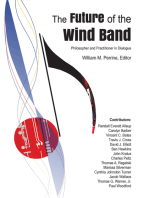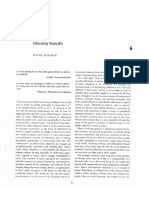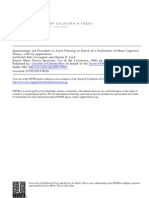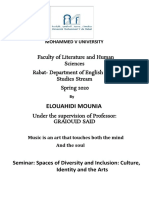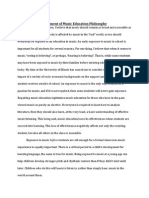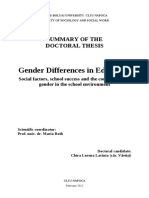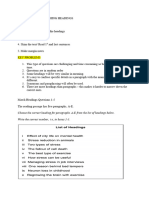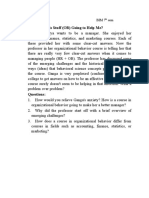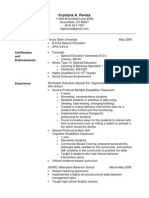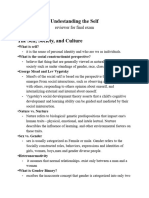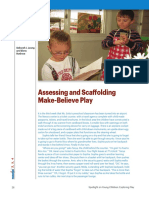Oxford Handbooks Online: Music Education Philosophy
Oxford Handbooks Online: Music Education Philosophy
Uploaded by
Luiz Felipe OliveiraCopyright:
Available Formats
Oxford Handbooks Online: Music Education Philosophy
Oxford Handbooks Online: Music Education Philosophy
Uploaded by
Luiz Felipe OliveiraOriginal Title
Copyright
Available Formats
Share this document
Did you find this document useful?
Is this content inappropriate?
Copyright:
Available Formats
Oxford Handbooks Online: Music Education Philosophy
Oxford Handbooks Online: Music Education Philosophy
Uploaded by
Luiz Felipe OliveiraCopyright:
Available Formats
Music Education Philosophy
Oxford Handbooks Online
Music Education Philosophy
David J. Elliott
The Oxford Handbook of Music Education, Volume 1
Edited by Gary E. McPherson and Graham F. Welch
Print Publication Date: Aug 2012 Subject: Music, Music Education
Online Publication Date: Nov 2012 DOI: 10.1093/oxfordhb/9780199730810.013.0005
Abstract and Keywords
This article introduces the field called “the philosophy of music education,” or music
education philosophy (MEP). The philosophy of music education is a relatively young
field, with many music educators unaware of its existence, not to mention its nature and
values. Indeed, specialized courses in MEP are still infrequent in undergraduate and
graduate music education curricula in North America and most other nations.
Nevertheless, there is a fairly sizeable and rapidly expanding international literature
intended to (1) analyze, synthesize, debate, or “problematize” and “worry” all theoretical
and practical aspects of music education and, thereby, to (2) inform teachers, university
music education students, and scholars about fundamental concepts, conceptions,
controversies, principles, and practices in school and community music education.
Keywords: music education, philosophy, music educators
One of the first things we notice about music is the innumerable ways societies and
individuals create, use, value, teach, learn, and conceptualize “musical” products,
processes, experiences, and so forth. We also notice that billions of people, past and
present, invest enormous amounts of time, effort, thought, passion, money, and,
sometimes, their entire lives in making specific kinds of sounds for listening and related
activities. But why? Although music is a fundamental and conspicuous dimension of all
human societies, making and listening to a special category of “musical” sounds is rather
unusual (if not downright odd) compared to the considerable efforts we make to fulfill our
basic survival needs. As many have noted, music does not seem to be a biological
necessity; yet music pervades all societies.
And what about education? While many societies (including some Western societies) fail
to provide adequate financial support for teachers, learners, and formal educational
institutions, nearly every society acknowledges and provides something we would
recognize as education, whether formal, informal, nonformal, or some combination of
Page 1 of 30
PRINTED FROM OXFORD HANDBOOKS ONLINE (www.oxfordhandbooks.com). (c) Oxford University Press, 2015. All Rights
Reserved. Under the terms of the licence agreement, an individual user may print out a PDF of a single chapter of a title in
Oxford Handbooks Online for personal use (for details see Privacy Policy).
Subscriber: New York University; date: 06 December 2016
Music Education Philosophy
these. But what, precisely, is “education”? How does “educating” differ from teaching,
training, indoctrinating, and schooling? What are the “proper” aims of formal education?
Of all things that can be taught and learned in public and private schools, what is most
valuable? How should these values be taught? How does music relate to the aims of
general education? One would expect music educators to have thoughtful answers to all
these questions and many more—to be knowledgeable about the nature and values of
education in broad, deep, and detailed ways.
Putting music and education together, how do we explain the nature and value of music
education in ways that are sufficiently logical, comprehensive, and (p. 64) compelling to
assure ourselves and others (e.g., parents, administrators, communities, and
governments) that we understand (1) why music is valuable for people to learn in formal
and informal music teaching situations; (2) what is best to teach (e.g., musical skills and
understandings, and/or “appreciation,” and/or civic and social dispositions, or something
else?); (3) how we ought to engage people of all ages and dispositions in educative,
ethical, and moving encounters with music and musical experiences; (4) where, when,
how much (and so forth) to teach; and (5) how we know when music education has
succeeded in enabling people to achieve music's most important values?
These are all philosophical questions. Why? Because what we commonly label “music,”
“education,” “music education,” “musical experience,” “music appreciation,” “talent,”
“teaching,” “learning,” “curriculum,” “assessment”—all these, and many more—are what
philosophers call “essentially contested concepts” (Gallie, 1956). Essentially contested
concepts are ambiguous, abstract, and value-laden terms that resist conclusive
definitions and scientific verification. Thus, whether or not people claim a general or
sophisticated understanding of music, or education, or how music education should be
conceived and taught, and regardless of whether it's possible to provide rational
explanations for privileging one concept of these constructs rather than another,
explanations will always be open to a wide range of interpretations, applications,
dialogues, and debates.
For example, what do music teachers mean and intend when they design lessons to
“teach musical creativity”? What counts as “musical” and what is “creativity”? Is there a
difference between “creating” music and composing it? If so, what? If teachers lack
logically valid concepts of music, teaching, and creativity, how can they possibly “teach
creativity”? Is a composition-based music curriculum better than a performance-based
curriculum, or a music history–based curriculum? Why, or why not? And what do we
mean by “music listening” in formal educational settings—do we mean “aesthetic
perception,” embodied music listening, listening to “classics,” iPod-listening, or listening
while we perform? Is “just listening” while we exercise, drink wine, or dance to hip-hop
“legitimate” listening that we ought to teach-for? From another perspective, how can we
Page 2 of 30
PRINTED FROM OXFORD HANDBOOKS ONLINE (www.oxfordhandbooks.com). (c) Oxford University Press, 2015. All Rights
Reserved. Under the terms of the licence agreement, an individual user may print out a PDF of a single chapter of a title in
Oxford Handbooks Online for personal use (for details see Privacy Policy).
Subscriber: New York University; date: 06 December 2016
Music Education Philosophy
be certain that qualitative and quantitative studies of (say) music teacher education,
musical experience, music assessment (and so on, ad infinitum) are valid, reliable, and
useful unless we’re sure that researchers begin their work with logically warranted
understandings of these concepts? In summary, how can we be confident that “music” is
being taught and learned comprehensively and ethically, with/for the benefit of students
of all kinds, unless we have assurances that the decisions and actions of school music
teachers and community music facilitators are based on rigorously reasoned beliefs and
principles that will guide (consciously and unconsciously) why, what, and how they carry
out their responsibilities?
Unfortunately, some music educators’ pedagogical assumptions, beliefs, and concepts are
unjustified and “reason-less.” Some teachers’ beliefs rest on mere commonsense,
unreflective experience, indoctrination, or poor textbooks, rather than careful, rational,
and critically reflective thinking. Thus, music teaching and (p. 65) learning is sometimes
misguided, unethical, or “mal-practiced.” Being a professional music educator,
community music facilitator, or artist-teacher demands more than musical skills and
understandings (formal and/or informal) and having practical savvy and experience.
These abilities and qualities are necessary, but not sufficient for teaching music
thoughtfully, wisely, effectively, compassionately, and ethically. Doing so requires
teachers to build, update, and maintain a professional philosophy-practice “guidance
system.”
Given these challenging intellectual, practical, and moral matters, it's not surprising that
the ubiquitous, diverse, and inspiring domain of music education has captured the
attention of philosophers for thousands of years. As Aristotle said in the Politics: “It is not
easy to determine the nature of music, or why anyone should have a knowledge of it.”
Indeed, everything music teachers and music education scholars encounter in their daily
work involves many ambiguous concepts, choices, and actions that involve logical, social,
and ethical dimensions of considerable complexity.
Where can students, teachers, and scholars find examples, strategies, and resources that
will help them clarify key concepts and develop professional philosophy-practice guidance
systems? Enter music education philosophy. This chapter is intended as an introduction
to the field called “the philosophy of music education,” or, if you prefer, music education
philosophy (MEP).
Page 3 of 30
PRINTED FROM OXFORD HANDBOOKS ONLINE (www.oxfordhandbooks.com). (c) Oxford University Press, 2015. All Rights
Reserved. Under the terms of the licence agreement, an individual user may print out a PDF of a single chapter of a title in
Oxford Handbooks Online for personal use (for details see Privacy Policy).
Subscriber: New York University; date: 06 December 2016
Music Education Philosophy
Music Education Philosophy: Outlining the
Field
Notwithstanding the seminal writings of philosophers and musicians in ancient Greece,
India, China, Arabia, Europe, and elsewhere, the philosophy of music education is a
relatively young field in North America, Europe, the United Kingdom, Australia, Greece,
Spain, Scandinavia, Asia, Africa, and other countries. Moreover, many music educators
are unaware of the field's existence, not to mention its nature and values. Indeed,
specialized courses in MEP are still infrequent in undergraduate and graduate music
education curricula in North America and most other nations. When philosophical issues/
discussions are included in North American music education programs, this often occurs
in the context of amorphous “foundations” courses or (sometimes) in methods courses. It
is also worth mentioning that when MEP is included in music teacher education, it is
often taught narrowly (i.e., from the perspective of one philosopher or one philosophical
perspective).
Nevertheless, there is a fairly sizeable and rapidly expanding international literature
intended to (1) analyze, synthesize, debate, or (as some contemporary writers prefer to
say) “problematize” and “worry” all theoretical and practical aspects of music education
and, thereby, to (2) inform teachers, university music education students, and scholars
about fundamental concepts, conceptions, (p. 66) controversies, principles, and practices
in school and community music education. Of course, it's impossible to provide a truly
equitable accounting of this literature, let alone a comprehensive discussion. Space is
restricted, and choices require exclusions, which means that somebody will always be
more or less offended. But there is nothing to be done about this, and there is nothing we
can do to identify individually all the music education philosophers who have and are
making enormous contributions to the field. That said, following below is an incomplete
accounting of a very sizeable literature, beginning with journals that contain the works of
many fine thinkers I cannot credit formally.
Two music education research journals, both of which originated in the 1990s, privilege
philosophical research: Action, Criticism, and Theory for Music Education and Philosophy
of Music Education Review. On a continuum ranging from journals that publish
philosophical articles more and less frequently, several come to mind immediately:
Journal of Aesthetic Education; Music Education Research; Research Studies in Music
Education; Gender Research in Music Education; International Journal of Music
Education-Research; Visions of Research in Music Education; Nordisk musikkpedagogisk
forskning, Arbok; British Journal of Music Education; The Finnish Journal of Music
Page 4 of 30
PRINTED FROM OXFORD HANDBOOKS ONLINE (www.oxfordhandbooks.com). (c) Oxford University Press, 2015. All Rights
Reserved. Under the terms of the licence agreement, an individual user may print out a PDF of a single chapter of a title in
Oxford Handbooks Online for personal use (for details see Privacy Policy).
Subscriber: New York University; date: 06 December 2016
Music Education Philosophy
Education; Inter-national Journal of Community Music; Bulletin of the Council for
Research in Music Education; Australian Journal of Music Education; Diskussion
Musikpädagogi; and Zeitschrift für Kritische Musikpädagogik. Importantly, most editorial
boards today are much more willing to consider philosophical submissions than before
1990, when positivistic research reigned supreme. The Oxford Handbook of Music
Education Philosophy (Bowman & Frega, 2012) is a highly welcome and notable addition
to the field's literature. Two previous music education research handbooks (Colwell,
1992; Colwell & Richardson, 2002) include important chapters related to philosophical
method and the role of philosophy in research, curriculum, and instruction.
Numerous books have played a significant role in the advancement of MEP since the
mid-1950s. Whether partly or wholly concerned with philosophical perspectives on the
nature and value of music education and its cognates, a necessarily selective list might
include: Human Values in Music Education (Mursell, 1934), Education for Musical Growth
(Mursell, 1948), Foundations and Principles of Music Education (Leonhard & House,
1959), Basic Concepts in Music Education (Henry, 1958), A Philosophy of Music
Education (Reimer, 1970, 1989, 2003), Aesthetics: Dimensions for Music Education
(Schwadron, 1967), Didaktik der Musik (Alt, 1968), A Basis for Music Education
(Swanwick, 1979), Musical Knowledge: Intuition, Analysis and Music Education
(Swanwick, 1994), Music Matters: A New Philosophy of Music Education (Elliott, 1995), In
Search of Music Education (Jorgensen, 1997), Philosophical Perspectives on Music
(Bowman, 1998), Der schwankende Boden der Lebenswelt: Phänomenologische
Musikpädagogik zwischen Handlungstheorie und Ästhetik (Vogt, 2001), Transforming
Music Education (Jorgensen, 2003), Democracy and Music Education: Liberalism, Ethics,
and the Politics of Practice (Woodford, 2005), Music Education for Changing Times
(Regelski & Gates, 2010), and What's So Important About Music Education? (Goble,
2010).
The picture that emerges from this brief overview of MEP shows a field that is
(p. 67)
rich, robust, and growing steadily in quantity and quality. Not surprisingly, however, the
philosophy of music education parallels other areas of philosophy (e.g., the philosophy of
education) insofar as it is not entirely uniform in quality. That is, while many music
education philosophers in North America, the United Kingdom, Europe, Australia,
Scandinavia, and other nations have produced numerous examples of outstanding journal
articles, books, and book chapters during the last 30 years, there are instances of less
rigorous thinking (which, of course, also holds for quantitative and qualitative research in
our field). If so, then there may be several interdependent causes, including the
longstanding absence of MEP courses in university music teacher education curricula,
which, in turn, explains the continuing shortage of professors and scholars who know
Page 5 of 30
PRINTED FROM OXFORD HANDBOOKS ONLINE (www.oxfordhandbooks.com). (c) Oxford University Press, 2015. All Rights
Reserved. Under the terms of the licence agreement, an individual user may print out a PDF of a single chapter of a title in
Oxford Handbooks Online for personal use (for details see Privacy Policy).
Subscriber: New York University; date: 06 December 2016
Music Education Philosophy
how to carry out and/or identify rigorous philosophical research. Another likely cause is
that many philosophers of music education are not educated wholly, or even partially, as
philosophers, but as musicians and pedagogues. This is not to say that musical and
pedagogical expertise is unimportant. On the contrary. Because MEP is arguably a form
of applied philosophy, music education philosophers ought to have a significant amount
of experience as musicians and teachers. But without a reasonable depth of background
in philosophy, and/or philosophy of music, and/or philosophy of education, some music
education philosophers will lack the skills and understandings necessary to discern the
intellectual viability of alternative views and create excellent philosophical arguments
and critiques. And without a reasonable knowledge of philosophical inquiry, future music
educators will lack the tools they need to develop their own philosophical foundations—
all of which brings us to a central question: What is philosophy?
Philosophy Is…?
Professional philosophers have divergent views on what counts as “philosophy.” Indeed,
after 3,000 years of Western philosophical thinking and debate, Lucas (1969) quips that
“if all the philosophers in the world were stretched end to end they would still not reach
an agreement” (p. 3). To complicate matters, efforts to explain philosophy's proper aims,
topics, and methods encounter the reality that, unlike other fields (e.g., computational
neuroscience, cultural studies, and linguistics), the terms “philosophy,” “philosopher,”
and “philosophize” are part of everyday public discourse. Given this factor, and contested
concepts of philosophy, some music education students and professors have the false
impression that philosophy is vague, “lofty,” and/or impractical, and that philosophical
understandings are not necessary for developing a personal philosophy of music
education. However, and notwithstanding problematic concepts of philosophy, it seems
reasonable to argue that our best efforts to prepare future music educators and music
education (p. 68) philosophers must include some rationally justifiable concept of what
philosophy is and how philosophy should be carried out, and how philosophy can
contribute to effective and ethical teaching. If so, then we need some basic criteria for
understanding what philosophy is. But where do we start? Let's begin by unpacking some
common uses of “philosophy.”
When laypeople use “philosophy,” they often use it in the “weak” sense—as a synonym for
an opinion, assumption, belief, or faith (Regelski, 2010a). For example: “My philosophy is
that (i.e., I believe) school music is just for the talented”; “I'm convinced (i.e., my
philosophy is) that when someone is composing creatively, they are creative”; “My
philosophy is (i.e., my opinion is) that learning an instrument teaches kids discipline”;
Page 6 of 30
PRINTED FROM OXFORD HANDBOOKS ONLINE (www.oxfordhandbooks.com). (c) Oxford University Press, 2015. All Rights
Reserved. Under the terms of the licence agreement, an individual user may print out a PDF of a single chapter of a title in
Oxford Handbooks Online for personal use (for details see Privacy Policy).
Subscriber: New York University; date: 06 December 2016
Music Education Philosophy
“My professor has written a book, so I know (i.e., I trust) that she's right about the values
of standardized testing in music.”
Again, these direct and indirect uses of “philosophy” are weak (or simply wrong) because
they associate philosophy with uncritical thinking and/or blind faith in fallible authority
figures and contested concepts (e.g., talent, creativity, discipline, and testing). Several
unfortunate consequences follow from weak notions of philosophy. For example, people
who accept weak notions tend to assume that they’re justified in holding their opinions or
“philosophies” because one person's opinions are just as good as any others, regardless
of logic or evidence to the contrary. Unfortunately, however, if everything counts, then
nothing counts. So how do we proceed to distinguish between weak and strong concepts
of philosophy? Let's tackle this question by following some simple “first steps” that
philosophers (in the strong sense) might follow (in much more depth than I have space
for here) to sift and sort helpful and less helpful insights. A simple first step would be to
scan various dictionaries; a second step would involve historical perspectives on the
meaning of philosophy; a third step would involve unpacking philosophy etymologically.
Let's follow these steps and continue with a few more.
If we consult contemporary dictionaries, as other philosophers have done (e.g., Stroll,
2009, p. 115), we find six possible definitions of philosophy (see: “What philosophy means
to me,” 2006):
• The rational investigation of the truths and principles of being, knowledge, or
conduct
• Any of the three branches, namely natural philosophy, moral philosophy, and
metaphysical philosophy, that are accepted as composing this study
• A system of philosophical doctrine: e.g., the philosophy of Spinoza
• The critical study of the basic principles and concepts of a particular branch of
knowledge, especially with a view to improving or reconstituting them: e.g., the
philosophy of science
• A system of principles for guidance in practical affairs
• A philosophical attitude, as one of composure and calm in the presence of troubles or
annoyances
Five of these definitions trace back to the early Greek sense of philosophy as a rational
process of analysis and investigation. But the sixth sense of philosophy is quite (p. 69)
different. It points us to the fact that many ancient thinkers conceived philosophy as
something akin to what Shusterman (1997) describes as “a deliberative life-practice that
brings beauty and happiness to its practitioners” (p. 3). Indeed, as Shusterman says,
Page 7 of 30
PRINTED FROM OXFORD HANDBOOKS ONLINE (www.oxfordhandbooks.com). (c) Oxford University Press, 2015. All Rights
Reserved. Under the terms of the licence agreement, an individual user may print out a PDF of a single chapter of a title in
Oxford Handbooks Online for personal use (for details see Privacy Policy).
Subscriber: New York University; date: 06 December 2016
Music Education Philosophy
some of history's most eminent philosophers (e.g., Socrates) communicated their
teachings and beliefs not through their theoretical writings, but through the critically
reflective and purposeful conduct of their admirable lives—through modeling inspiring
modes of life (and death) in the pursuit of self-knowledge about and for their own and
others’ well-being. Admittedly, some contemporary philosophers may reject the idea of
philosophy as the lifelong contemplation and practice of “artful living”—of virtuous and
healthy living for oneself, for the happiness of others, and for the well-being of society as
a whole. But care for one's selfhood and the well-being of others remains an admirable
aim of philosophical practice. In fact, this aim is central for many contemporary
philosophers of education and for a growing number of music education philosophers.
History takes us another step forward. Stroll (2009) reminds us that “many of the earliest
philosophers did not distinguish sharply between scientific and moral questions” and that
some of their topics “were more or less the same as those of modern scientists” (p. 113).
At the same time, says Stroll, “Aristotle describes his predecessors [beginning with
Thales, arguably the first Greek philosopher] as scientists who investigated nature ‘in
order to know and not for any utilitarian end’ ” (p. 113). Indeed, they also investigated
and theorized nonscientific issues—the nature of the “good life,” concepts of ethical
action, the values of education, and so forth—by means of reason rather than experiment.
If we consider the etymology of the word, we see that philosophy comes from two Greek
words: philos (loving) and sophia (wisdom). But what is the wisdom that philosophy helps
us understand? Critchley (2010) explains that “for Socrates, and for nearly all ancient
philosophers that came after him, the wisdom that philosophy teaches concerns what it
might mean to lead a good human life” (p. 1), meaning a happy life. So philosophy
involves living a reflective life, an “examined life,” not just living or surviving. Through
careful thought, and the cultivation of a wise and prudent curiosity, philosophy not only
informs us, it “forms” our “habits of heart and mind,” our character—our ways of living
fully. Critchley adds a key point: “although the unexamined life is not worth living, the
unlived life is not worth examining, and philosophy for the ancients was not divorced
from the practical to and fro of everyday life” (p. 1). Indeed, philosophy was viewed as a
very practical activity, not a purely theoretical endeavor, as many people see it today.
Thus, as Passmore (1967) explains, the Greek sense of sophia was broader than our
modern English sense of “wisdom”; to the Greeks, the verb philosophein also meant “to
find out” (p. 216). Accordingly, “philosophia etymologically connotes the love of
exercising one's curiosity and intelligence rather than the love of wisdom” (p. 216). In
short, philosophy should be understood as both a noun and a verb, as a vast body of
inherited wisdom and as an active form of “applied thoughtfulness.” As Wittgenstein says
(as cited in Malcolm, 1967): “What is the use of studying philosophy if all that it does for
you is to enable you to talk with some plausibility about (p. 70) some abstruse questions
Page 8 of 30
PRINTED FROM OXFORD HANDBOOKS ONLINE (www.oxfordhandbooks.com). (c) Oxford University Press, 2015. All Rights
Reserved. Under the terms of the licence agreement, an individual user may print out a PDF of a single chapter of a title in
Oxford Handbooks Online for personal use (for details see Privacy Policy).
Subscriber: New York University; date: 06 December 2016
Music Education Philosophy
of logic, etc., and if it does not improve your thinking about the important questions of
everyday life?” (p. 39). Stroll (2009) combines these themes: “Philosophy is the strong
liking for knowledge of what is true or right, coupled with just judgments as to action;
sagacity, prudence, or common sense” (p. 117). Clearly, then, philosophy (properly
understood) is not idle speculation; philosophy is “a tool for the clarification of meaning…
philosophy allows one to understand more clearly and decide important issues” (Regelski,
2010a, p. 6).
In terms of music teaching and learning, I suggest that an unexamined professional life is
not worth living or pursuing. An unexamined professional life is potentially damaging and
dangerous because what teachers do in each and every moment of teaching involves the
well-being of people—children, young people, and adults. Put another way, MEP not only
informs us, it “forms” our habits of teaching effectively, wisely, ethically, and
compassionately—philosophy, done well, informs and forms our ways of living and
working fully. As such, MEP should never be optional in music teacher education; it
should be fundamental and central.
Critchley (2010) tackles philosophy from another angle by asking, “What is a
philosopher?” He answers by invoking Socrates's comparison of a philosopher and a
lawyer. In Greek times, says Critchley, lawyers were compelled to prepare and present
their court cases in a very short amount of time, which led to errors and ethical lapses. In
contrast, “the philosopher is the person who has time or who takes time” (p. 1) to think
carefully, examine issues from all sides, over time, and draw logically balanced
conclusions. In short, to philosophize is to “take your time” in order to reflect rigorously.
Another characteristic of truly professional philosophers is that they tend to ignore
academic cliques and eschew the approbation of their peers. Thus, some people often
belittle philosophers for their aloofness, their indifference to symbols of popularity, and
their impatience with the status quo. Shand (2009) adds another important perspective
when he emphasizes that doing philosophy requires thinking “in a determinedly open
minded way, with no holds barred; think, as one might say, to the limits” (p. 4). This can
be difficult. The natural inclination is to “salute” the latest trends, embrace the ideas of
venerable “authorities,” and/or overlook the weaknesses in one's own sources and
theories.
Summarizing to this point, people tend to use “philosophy” in three basic ways. First,
many people “philosophize” from time to time as part of their everyday lives: that is,
people often puzzle over their decisions, ideas, beliefs, relationships, and actions and the
actions of others. Let's call this “everyday philosophy.” In a stronger sense, some people
are disposed (because of an inquisitive or educated disposition) to think about their lives,
actions, and professions with more than a usual amount of care and rational reflection,
which we might call “informal philosophy.” Third, there's the “capital-P” or scholarly
Page 9 of 30
PRINTED FROM OXFORD HANDBOOKS ONLINE (www.oxfordhandbooks.com). (c) Oxford University Press, 2015. All Rights
Reserved. Under the terms of the licence agreement, an individual user may print out a PDF of a single chapter of a title in
Oxford Handbooks Online for personal use (for details see Privacy Policy).
Subscriber: New York University; date: 06 December 2016
Music Education Philosophy
sense of philosophy, as carried out by academic philosophers. Let's examine the latter in
more detail.
An understanding of “capital-P” philosophy starts by acknowledging “that some ways of
thinking about things are more defensible or justified, when assessed by the merits of the
arguments for and against them, than others” (Shand, 2009, p. 3). While this may seem
too obvious to mention, it's not obvious to those who (p. 71) assume that “a philosophy” is
synonymous with an opinion or a viewpoint, or that everyone is entitled to their own
opinions, or that one view is as good as any other. Shand calls these assumptions
“intellectual nihilism” (p. 3). Implicit in these notions is the belief that there are no
criteria for assessing a debate, dialogue, or philosophical argument as good, bad, or
valid. But this overlooks one of the most unique attributes of human nature—our ability to
reason our way to good decisions about what is best to think and do. This is not to
suggest that we should “reason” as if we were “brains alone.” Excellent philosophers do
not remove themselves from the world, nor do they deny their emotional and embodied
selves. Still, rationality is at the core of what serious philosophers do. Without logical
thinking, the door is open to an “anything-goes” mindset. Stated differently, what does
philosophy have to offer music education if music education philosophers eschew reason
and logic? Unfortunately, as in all fields, some authors of MEP books, articles, and
“critical” commentaries undercut the potential values of their work by (a) committing
various fallacies—i.e., errors in reasoning, of which there are more than 100 (Angeles,
1981, p. 95), that ignore the structures and rules of logical validity,—and/or (b) by
substituting unsubstantiated opinions for carefully evidenced arguments. What remedies
are there? In addition to granting MEP a central place in music teacher education, music
educators would benefit from (for example) studying the work of today's leading
philosophers of education and/or music (e.g., Nel Noddings, Jane Roland Martin, David
Carr, Joseph Dunne, Paulo Freire; Jenefer Robinson, Kathleen Marie Higgins, Stephen
Davies, Theodore Gracyk, Philip Alperson, Noël Carroll, Jerrold Levinson, Peter Kivy,
Jeanette Bicknell, etc.). These thinkers (among several others) provide excellent models
of how to formulate logical and warranted arguments about the nature and values of
education and music and how to effectively challenge and “repair” fallacious arguments
in the writings of others.
Of course, formulating new arguments, identifying fallacies, and challenging existing
philosophies can be difficult for many reasons. Aside from the demands of doing
philosophical work, being critically reflective can have serious professional and personal
consequences (consider the price that Socrates paid). As Jorgensen (1992) warns, we
should not be surprised that “doing philosophy in music education may sometimes be
disturbing, uncomfortable, even painful” (p. 98) for philosophers and critics alike.
However, says Jorgensen, although “the critique that philosophy brings and the vision it
Page 10 of 30
PRINTED FROM OXFORD HANDBOOKS ONLINE (www.oxfordhandbooks.com). (c) Oxford University Press, 2015. All Rights
Reserved. Under the terms of the licence agreement, an individual user may print out a PDF of a single chapter of a title in
Oxford Handbooks Online for personal use (for details see Privacy Policy).
Subscriber: New York University; date: 06 December 2016
Music Education Philosophy
offers may be destructive of complacency,” the process of challenging claims and
assumptions is well worth the price for people seeking deeper understandings (p. 99),
including philosophers, critics, and the critics of critics.
Given the above, we see the wisdom of Bowman's words: “the trick is to recognize the
fallibility of logic and reason, and their potential abuses (intentional and unintentional),
without renouncing them altogether” (W. Bowman, personal communication, July 28,
2010). Which brings us to another major question: How, more specifically, do
philosophers actually do philosophy? Not surprisingly, philosophers differ in their views
on “philosophical method.” This lack of consensus can be attributed to the fact that ways
of doing philosophy are always influenced (p. 72) by personal dispositions, allegiances,
and the historical and intellectual ethos of a given time and culture (Regelski, 2010a).
Nevertheless, it is possible to make several basic points with reasonable assurance.
Philosophical Method
In The Practice of Philosophy, Rosenberg (1984) states that philosophy is a process of
developing arguments for and against concepts, claims, theories, and beliefs, whether
these concepts and claims belong to oneself or others. In philosophy, the term
“argument” refers to a series of statements that present a philosopher's reasons for his or
her beliefs. “In the clearest sort of case,” says Rosenberg, “one of these statements will
be tagged as the intended conclusion, expressing the target belief which requires
support…the conclusion is what is argued for; the premises are what is argued from” (p.
12). Intervening statements link premises to conclusions by means of careful logic
(deductive, inductive, analogical, etc.), as well as evidence, authority, and/or precedents.
The philosopher's aim is to “warrant”— to justify, support, or defend—the statements that
he or she makes for his or her conclusions. Evidence, authority, and precedents include a
range of logical and relevant public knowledge including pertinent arguments by other
philosophers, past and present, the conclusions of experts in related fields, and, when
applicable, quantitative and qualitative data. Clearly, when consulting and drawing on
various kinds of evidence to warrant their arguments, philosophers must evaluate
carefully the validity of this evidence.
Implicit in everything I’ve suggested so far are the fundamental issues of language and
concepts. That is, in the process of creating or criticizing arguments, philosophers must
be vitally concerned with the ways they employ language to organize and articulate their
concepts and critique the arguments and concepts of others. As Shand (2009) says,
“concepts may be considered as the building blocks of articulate organized thought.
Page 11 of 30
PRINTED FROM OXFORD HANDBOOKS ONLINE (www.oxfordhandbooks.com). (c) Oxford University Press, 2015. All Rights
Reserved. Under the terms of the licence agreement, an individual user may print out a PDF of a single chapter of a title in
Oxford Handbooks Online for personal use (for details see Privacy Policy).
Subscriber: New York University; date: 06 December 2016
Music Education Philosophy
Without them…it would not be possible to think about anything, because to think about
something is to apply a concept to it” (p. 5).
Enter “conceptual analysis.” Put simply (very simply), conceptual analysis means
breaking down ideas, concepts, and arguments into their constituent parts to clarify their
logical structure. It means dissecting the elements and assumptions underlying concepts,
premises, arguments, claims, and conclusions—one's own and others’—to understand a
particular philosophical issue in which concepts are involved. Beaney (2009) adds that
conceptual analysis is “a process of isolating or working back to what is more
fundamental by means of which something, initially taken as given, can be explained or
reconstructed” (p. 1). (The previous step-by-step examination of “philosophy” is a tiny
example of conceptual analysis). In a little more detail, the process of conceptual (p. 73)
analysis—applied to one's own or other philosophers’ work—includes (for example)
clarifying terms; making careful distinctions between and among concepts; explaining,
exposing, and evaluating assumptions, “commonsense” ideas and/or “received wisdom”;
and using logic and evidence to support or challenge one's own or others’ use of given
concepts. Without the techniques of logic and conceptual analysis, it's impossible to
develop rational and coherent perspectives, or expose the errors that may underpin other
philosophers’ premises and conclusions.
Given the above, we begin to see why Rosenberg (1984) and other philosophers
emphasize that philosophy is best understood in relation to its methods rather than its
subject matter (p. 6). That is, philosophy is concerned with everything human beings do
and think. Accordingly, there is (for example) the philosophy of medicine, the philosophy
of music, the philosophy of education, the philosophy of science, the philosophy of mind,
the philosophy of emotion, and so on, ad infinitum. Philosophy is centrally concerned with
issues that cannot be addressed by observation, description, or experiment alone. The
products of good philosophizing are not new facts but new perspectives on the concepts,
assumptions, beliefs, and meanings that inhabit, underpin, drive, and steer our thinking
and doing. In short, philosophy is a “second-order” discipline: philosophers are concerned
with understanding, evaluating, and theorizing the “first-order” problems, actions,
claims, achievements, and guiding concepts of educators, physicians, scientists, artists,
everyday human experiences, and so on.
While many philosophers of medicine, music, and education are physicians, musicians,
and educators themselves, and while philosophers in these fields frequently draw
examples from their own work, this does not hold in all cases, nor is it sufficient for being
a “philosopher of” these areas. In other words, philosophers do not always deal directly
with (say) treating cancer, performing the blues, or teaching secondary school.
Page 12 of 30
PRINTED FROM OXFORD HANDBOOKS ONLINE (www.oxfordhandbooks.com). (c) Oxford University Press, 2015. All Rights
Reserved. Under the terms of the licence agreement, an individual user may print out a PDF of a single chapter of a title in
Oxford Handbooks Online for personal use (for details see Privacy Policy).
Subscriber: New York University; date: 06 December 2016
Music Education Philosophy
If so, then what do philosophers in specific areas share in common, other than their
fascination with and experience in their domain? Philosophers understand the
philosophical discourse that constitutes the historical record of their domains.
Philosophers of education, for example, know and understand what Plato, Aristotle,
Rousseau, Dewey, Carr, Dunne, Scheffler, Noddings, Martin, Greene, and many other
educational philosophers have said about the nature and values of education and its
cognates. Thus, the history of philosophical arguments, concepts, and controversies in a
given field is an essential part of philosophical method because it provides “a shared
vocabulary of concepts, and a set of paradigms of philosophical reasoning” (Rosenberg,
1984, p. 11) that serve as key sources of critical dialogue and new philosophizing.
The next two sections of this chapter provide brief reviews and examinations of (1)
several (but not all) paradigms of philosophy and philosophical method, and (2) key
concepts and issues in the historical discourse of the philosophy of music. Taken
together, both sections set the scene for the final section of this chapter, which
summarizes some important junctures and developments in the discourse (p. 74) of MEP.
Note that the topics in each of the next three sections deserve much deeper treatments
than it's possible to provide in the constraints of this chapter.
Philosophical Paradigms
In the broadest sense, analytic philosophy is an umbrella term for diverse types of
twentieth-century conceptual analysis. Although Socrates, Plato, and Aristotle engaged in
basic forms of conceptual analysis (as did Kant and many others, in a variety of ways),
“analytic philosophy,” as philosophers name it today, dates back 100 years or so to
England, where its originators (e.g., Russell, Carnap, Frege, Moore) employed extremely
abstract, symbolic-mathematical forms of logic. To take a tiny example, the simple
tautology “All bachelors are unmarried” would transform to this in analytic philosophy:
“x((Fx & Gx) → Gx).” This approach to philosophy swept Western university philosophy
departments, where it dominated until the 1950s or so, and it is still present in some.
Analytic philosophy is almost entirely absent from the history of MEP, with the possible
exception of Fiske's (1990) Music and Mind, which makes some use of analytic
techniques.
Although he was initially and profoundly influenced by Russell and his colleagues,
Wittgenstein challenged the excesses of traditional analytic philosophy and departed
radically from this approach when he and his followers (e.g., Ryle, Austin) initiated a
transition to a more concise form of analysis that became known as ordinary language
Page 13 of 30
PRINTED FROM OXFORD HANDBOOKS ONLINE (www.oxfordhandbooks.com). (c) Oxford University Press, 2015. All Rights
Reserved. Under the terms of the licence agreement, an individual user may print out a PDF of a single chapter of a title in
Oxford Handbooks Online for personal use (for details see Privacy Policy).
Subscriber: New York University; date: 06 December 2016
Music Education Philosophy
philosophy. Wittgenstein's work was also responsible for the development of quietism,
which evolved from his concern for linking philosophical thinking to the social world and
eschewing analytic philosophy's artificial languages (e.g., symbolic logic), which quietists
view as the source of needless diversions, complications, and confusions. Quietist
philosophers ask, “Is X a real philosophical or practical problem, or is it simply a pseudo-
problem that arises from confusing language or misguided thinking?” Quietists aim to
extinguish philosophical fires before they start, thereby restoring intellectual “peace and
quiet.”
In the philosophy of music, excellent examples of ordinary language philosophy include
Higgins's (1991) analyses of Langer's (1942; 1953; 1966) philosophy of music and Kivy's
(1980) concept of musical expression; Bicknell's (2005) discussion of the interpretation of
songs; and Sparshott's (1994) extensive analysis of musical “aesthetics.” Examples of
conceptual analysis in music and MEP include Bowman's (1998) study of numerous
philosophies of music (2010); Jorgensen's (2002) analysis of the concept of curriculum;
Regelski's (2006) examination of music appreciation; Elliott's analyses of social justice
(2007a) and performativity (2007b); and Vogt's (2003) probe of the assumptions
underlying any attempt to develop a philosophy of music education.
Jorgensen (1992) makes a key point: overall, she says, “there has been relatively little
analytic philosophy” (in the broadest sense of the term) in music education (p. 98). She is
correct again when she avers that “in music education, philosophical (p. 75) thought has
been dominantly synoptic; witness the work of Reimer” (p. 98). By “synoptic,” Jorgensen
means that most MEP is constructed in top-down fashion, often with little concern for
critical, conceptual analyses. For example, in a synoptic approach a music education
philosopher “downloads” a philosophy of music by a prominent scholar (e.g., Langer) as a
basis for his or her philosophy of music education. Reimer uses a synoptic approach in
three editions of A Philosophy of Music Education (1970, 1989, 2003), all of which rest
squarely on Langer's concept of the nature and value of music, which claims that (1)
music equals works of music, and (2) musical works are valuable because they are
symbols of human feeling that educate feeling when we listen aesthetically, or make
music.
A great deal more needs to be said about varieties of conceptual analysis, but we must
say a few words (far too few) about three other philosophical movements that are present
in varying degrees in current MEP. First, pragmatism, which is often contrasted with
analytic philosophy, was founded and developed by three noted American philosophers:
Peirce, James, and Dewey. Basically, pragmatic and praxial philosophers engage in
varying forms of ordinary language philosophy and quietism (except for Peirce, who has
strong ties to formal logic). At the heart of pragmatism is the belief that “truth” depends
on its human and social usefulness in ethical action. The writings of Bowman (2005,
Page 14 of 30
PRINTED FROM OXFORD HANDBOOKS ONLINE (www.oxfordhandbooks.com). (c) Oxford University Press, 2015. All Rights
Reserved. Under the terms of the licence agreement, an individual user may print out a PDF of a single chapter of a title in
Oxford Handbooks Online for personal use (for details see Privacy Policy).
Subscriber: New York University; date: 06 December 2016
Music Education Philosophy
2003) and Regelski (2005, 2010b) exemplify their deep commitments to praxial-
pragmatist arguments and ideals. Goble (2010) is notable for his applications of Peirce.
“Continental philosophy” includes a range of “movements” and intellectual dispositions
including (but not limited to) phenomenology, poststructuralism, and critical theory. And
feminist theory has been exceptionally important in expanding and refining discourses
and methodologies. All of these paradigms, and more, have been common in the
literature of educational philosophy (e.g., McLeod, 1998; McNay, 1992; Stone, 1994;
Kohli, 1995, to name a few) for many years, but their appearance in music and MEP is
more recent. Like the terms “analytic” and “continental philosophy,” “postmodern
philosophy” is an umbrella term for a family of viewpoints. Very simply (too simply),
postmodern philosophers are highly skeptical about many traditional philosophical
practices, including logical argument and conceptual analysis. To postmodernists, reason
and logic tend to ignore the diversity of people's beliefs about and experiences of
embodiment, justice, politics, power, race, and so forth. Feminist philosophers emphasize
that philosophical objectivity is an illusion because our philosophical legacy has been
generated almost exclusively by males for males, thereby ignoring female perspectives,
experiences, and values. On this view, traditional philosophy, conceived as an objective,
impersonal, and historical enterprise, is biased and political: it is anathema to many
feminist scholars’ commitment to pursuing plural, multiple, and inclusive solutions. In
sum, postmodern and feminist philosophers make a serious point when they argue that
traditional philosophy has not been sufficiently inclusive, because it has omitted many
fundamental dimensions of human thinking, being, and action. Until very recently, this
also holds for traditional work in the philosophy of music.
Not surprisingly, there are strong criticisms of postmodern dispositions and forms
(p. 76)
of argument, both inside and outside music education. Fundamentally, as Best and
Kellner (1991) point out:
the interest in postmodern theory ultimately derives from fascination with our
present moment, with the current social situation in which we find ourselves and
its often surprising developments and events. Yet in articulating the new,
postmodern theory…tends to degenerate into sloganeering and rhetoric without
any systematic or comprehensive theoretical position…. Theory itself is
“postmodernized,” adapting to the speed, fashions, superficiality, and fragmented
nature of the contemporary era. Theory thus becomes a hypercommodity, geared
to sell and promote the latest fashions in thought and attitudes. (p. 140)
Postmodern music education philosophizing can be problematic when it emulates
synoptic procedures. In music education, some (but not all) postmodern publications
favor downloading the ideas of celebrated postmodern and quasi-postmodern theorists
Page 15 of 30
PRINTED FROM OXFORD HANDBOOKS ONLINE (www.oxfordhandbooks.com). (c) Oxford University Press, 2015. All Rights
Reserved. Under the terms of the licence agreement, an individual user may print out a PDF of a single chapter of a title in
Oxford Handbooks Online for personal use (for details see Privacy Policy).
Subscriber: New York University; date: 06 December 2016
Music Education Philosophy
and philosophers, including, for example: Baudrillard, Butler, Derrida, Deleuze, Delpit,
Foucault, Freire, Giroux, Guattari, Lyotard, and Marcuse. Another term for postmodern
“method” in music education is what Regelski (2010a) calls “lens-ism” or
“perspectivism.” In this variation on the synoptic approach, some postmodernists (but not
all) aim to “problematize,” “trouble,” or “worry” various aspects of music pedagogy
“through the lens” of a particular postmodern theorist. Generally speaking (but not
always), postmodern perspectives on music education are less concerned with topics
related to the sonic-artistic natures and values of music, musical experience,
musicmaking and listening, musical understanding (and so on) and more concerned with
how instruction and curriculum function to embody and/or remedy abuses of power, race,
gender, social justice, and so forth. There is no doubt whatsoever that these are hugely
important issues that music education scholarship has largely failed to examine in the
past. But in terms of philosophical processes, the difficulty with “troubling” any issue
through a specific lens is that “lenses” always have theoretical and normative blind spots.
Thus, analyzing an aspect of music education through the lens of a specific theorist
causes some philosophers to overlook what their chosen theorist/theory does not say, or
what critics of their chosen lens have to offer. For example, when philosophers of
education and music education promote Freire's critical pedagogy, they sometimes omit
to include other philosophers’ critical perspectives on Freire's views. Of course, the same
applies to philosophical discourse that privileges the thoughts of (say) Aristotle, Kant,
Marx, Adorno, Langer, Rorty, Greene, and so forth.
In contrast to top-down philosophy, Dewey suggests that philosophers should be very
cautious before accepting the theoretical assumptions of past or present scholars. Dewey
urges philosophers to begin their inquiries from the bottom up; he advises that we avoid
“given” and possibly flawed frameworks and assumptions by seeking answers in actual,
everyday, social experiences and social practices, which is the preferred approach of
pragmatic and praxial philosophers.
Finally, the very recent field of experimental philosophy, or x-phi, holds that many
problems confronting contemporary society (e.g., the nature of consciousness, moral
responsibility, intentional action) cannot be solved by philosophical analyses (p. 77)
alone. X-philosophers are currently integrating conceptual analyses and scientific
procedures to investigate a wide range of long-standing human issues. At present, this
potentially rich approach is almost completely absent in music education.
Page 16 of 30
PRINTED FROM OXFORD HANDBOOKS ONLINE (www.oxfordhandbooks.com). (c) Oxford University Press, 2015. All Rights
Reserved. Under the terms of the licence agreement, an individual user may print out a PDF of a single chapter of a title in
Oxford Handbooks Online for personal use (for details see Privacy Policy).
Subscriber: New York University; date: 06 December 2016
Music Education Philosophy
Philosophy of Music and Music Education
I suggested earlier that the literature of philosophical arguments, concepts, and
controversies in a given field is an essential part of philosophical inquiry. Thus, and in
addition to a reasonable degree of knowledge concerning philosophical methods, anyone
interested in doing MEP also needs a knowledge of the history and discourses of (1) the
philosophy of music, (2) music education, and (3) the philosophy of education.
“The philosophy of music,” says Alperson (1994), “consists in the sustained, systematic
and critical examination of our beliefs about the nature and function of music” (p. 3).
“The nature and value of music” involves an extraordinarily wide range of issues,
problems, and questions. Since the history of music philosophy has been thoroughly
documented in richly contextual versions (e.g., Goehr, 2000; Sparshott, 1982), concise
and conceptual formats (e.g., Alperson, 1994; Higgins, 1991), and focused, topic-related
versions (e.g., Cross & Tolbert, 2009; Lippman, 1964; Regelski, 2009), I will not attempt
anything of this scope. Likewise, the philosophy of education is a vast and complex field
that has been documented by many scholars (e.g., Bailey, Barrow, Carr, & McCarthy,
2010; Blake, Smeyers, Smith, & Standish, 2003; Gutek, 2008). Thus, I cannot and will not
attempt to summarize or discuss this massive literature, either. Instead, I’ll focus on
basic themes in music and MEP.
Music—mousikē, música, Musik, musikk, muzyka—notwithstanding the many names we
give it, the ways we make and listen to it, and the forms it takes, it's possible to sketch
three basic ways one might conceptualize “music,” which in fact have exerted a powerful
influence on the thinking of scholars and music educators past and present. It's also
possible and important to mention why these three concepts hold very different
implications for music teaching and learning.
In Greek society, “music” was not conceived as “works” or pieces of music that existed
for listeners’ contemplation; music was not conceptualized as a “workcentered” art.
Instead, music was considered a social praxis that existed for its social and ethical uses
and values. Everything “musical” was integrated with ceremonies, celebrations, feasts,
rituals, entertainments, education, ethical development, emotional regulation, therapy,
and so forth. Put another way, music was “praxial” or pragmatic in its nature and value;
music was viewed and practiced holistically, as an integration of dimensions: people,
processes, products, and the situated, socialethical values of these dimensions.
These praxial themes hold in many world musics past and present. For example, “the
Navajo people view music as medicinal” (Higgins, 1991, p. 12); the (p. 78) Finnish-
Page 17 of 30
PRINTED FROM OXFORD HANDBOOKS ONLINE (www.oxfordhandbooks.com). (c) Oxford University Press, 2015. All Rights
Reserved. Under the terms of the licence agreement, an individual user may print out a PDF of a single chapter of a title in
Oxford Handbooks Online for personal use (for details see Privacy Policy).
Subscriber: New York University; date: 06 December 2016
Music Education Philosophy
Karelian itkuvirsi is a ritual death lament improvised by women to guide community
mourning; and the Kaluli people of Papua, New Guinea, “make duets with birds, cicadas,
and other forest sounds; and they often sing when near a waterfall, for they consider the
waterfall to be a desirable musical accompaniment” (p. 15). As explained elsewhere
(Cross & Tolbert, 2009; Higgins, 1991; Regelski, 2009; Elliott & Silverman, forthcoming;
Elliott & Silverman, 2012b), music continued to be dominantly praxial (and vocal) across
all cultures until the mid-eighteenth century in Europe. Even in the context of medieval
and Renaissance music education, music was viewed as a social praxis tied to issues of
social status, gender, and worship (Murray, Weiss, & Cyrus, 2010). This is not to say that
issues related to sonic structures were ignored; rather, sonic structures were always
related to historical/social/cultural needs, experiences, values, and contexts, including
other sensory experiences. Higgins (1991) summarizes key points:
One of the most important features of music is experiential context. Most musical
experience throughout history and across cultures has been imbedded in
extramusical experience—indeed it is unimaginable without it—the extramusical
has had a decisive impact on the meaning of the music for the listener. (p. 16)
This long-standing situation changed gradually in Europe with the dawn of the
Enlightenment. At that point, a new concept of music began to emerge: music was
conceptualized as an “aesthetic,” work-centered “fine art” (Kristeller, 1990) and equated
with “pure” instrumental music. According to the aesthetic concept, which was conceived
by a small group of elite, male thinkers in the specific cultural, economic, and political
circumstances of eighteenth- and early nineteenth-century Europe, the value of music
resides entirely in the formal structures of musical “works”—in “the music itself.” There
have been many variations on the premises and corollaries of the aesthetic concept
during the last 250 years of aesthetic theorizing. Most notably, the aesthetic doctrine
argues that musical works exist to be perceived with an “aesthetic attitude”—with
distanced and “disinterested” attention to the complexity and novelty of a work's formal
properties. When listeners listen aesthetically, they (allegedly) undergo an “aesthetic
experience,” a kind of otherworldly, intellectual-emotional pleasure. Conceived in these
vague terms, “aesthetic meaning” is processed rationally and yet “ineffable.” Musical
experience is conceived as music “cognition” or “perceptual structuring” focused on
musical elements and form. Even musical feelings and emotions are viewed as resulting
from cognitive processes alone.
To a large degree, these premises anchor many philosophical writings about musical
affective experience and music education, past and present (e.g., Hanslick, 1854; Kivy,
1980; Langer, 1942, 1953; Meyer, 1956; Reimer, 1970, 1989, 2003). And aesthetic notions
still underpin a theoretical and practical division between “art for art's sake” and musical
Page 18 of 30
PRINTED FROM OXFORD HANDBOOKS ONLINE (www.oxfordhandbooks.com). (c) Oxford University Press, 2015. All Rights
Reserved. Under the terms of the licence agreement, an individual user may print out a PDF of a single chapter of a title in
Oxford Handbooks Online for personal use (for details see Privacy Policy).
Subscriber: New York University; date: 06 December 2016
Music Education Philosophy
actions that are beneficial in practical and social ways (Higgins, 1991; Bowman, 2005;
Korsmeyer, 2004; Regelski, 2009). The notion of aesthetic value, says Korsmeyer, was
attached to the new concept of “good taste” (p. 28), as opposed to music for social
bonding, embodied pleasure and enjoyment, entertainment, play, healing, group
satisfaction, and other social-ethical benefits (p. 79) that can arise from music as praxis.
“Aesthetic appreciation” fostered a listener-work separation that privileged a
disembodied relationship with the syntax of instrumental music, rather than a concrete,
embodied, practical, and participatory relationship with musical-social sounds of all
kinds, vocal as well as instrumental, and group experiences of music-making.
Privileging musical products and conceiving music in terms of aesthetic objects—music
as removed from and placed above ordinary life in a special “aesthetic realm”—has had a
dramatic effect on Western musical values and music education. In addition to the
implausible claim that musical meaning and value is entirely intrinsic—“in the music
itself”—the aestheticization of music causes many music teachers to assume that
everything that is not “serious” music is merely popular, entertainment, or mass music
(Regelski, 2005, 2006, 2009, 2010b). However, as Bourdieu says (cited in Regelski, 2004),
what past and present followers of the aesthetic concept overlook is that their elite class-
based notions of music are, themselves, historical and institutional inventions. Indeed,
adds Higgins, “the Western [aesthetic] classical tradition is unique in taking the
paradigm of music to be a musical work…. This tendency of the Western classical
tradition…allows us to think of music unproblematically as a natural kind” (1991, p. 13).
Conflating “music” with “works” of music may seem obvious and harmless. But as
Higgins says, “it is obviously faulty, or at least incomplete, for it does not apply to all
music. The music of the world does not all conform to the Western model of the ‘separate,
identifiable, coherent, intentionally developed and individually composed’ work” (p. 13).
Even large categories of Western music do not conform to this model, including all
improvised musics; rock, pop, and hip-hop styles; avant-garde music; film music, and so
on.
Despite obvious flaws in the premises of the aesthetic concept of music, some
contemporary philosophers of music still labor under its influence. For example, in the
Stanford Encyclopedia of Philosophy, Kania's (2007) chapter on the philosophy of music
focuses exclusively on the main tenets of the work-concept and on the assumption that
“pure [instrumental] music often presents the most difficult philosophical problems” (p.
2). The problems that have occupied Western aesthetic philosophers since the nineteenth
century are largely concerned with the ontology of musical works, the authenticity of
performances of works, the cognitive evocation and expression of musical emotion by
works, the nature and value of understanding musical works, and so forth.
Page 19 of 30
PRINTED FROM OXFORD HANDBOOKS ONLINE (www.oxfordhandbooks.com). (c) Oxford University Press, 2015. All Rights
Reserved. Under the terms of the licence agreement, an individual user may print out a PDF of a single chapter of a title in
Oxford Handbooks Online for personal use (for details see Privacy Policy).
Subscriber: New York University; date: 06 December 2016
Music Education Philosophy
The scholars cited by Kania include several contemporary music philosophers: for
example, Alperson, Bicknell, Budd, Carroll, Davies, Goehr, Kivy, Levinson, Robinson,
Scruton, Walton, and Zangwill. The philosophical dispositions of these scholars range
across a wide continuum, from those aligned closely with traditional aesthetic doctrine to
several that reject most aspects of this doctrine. Unfortunately, these philosophers’ ideas
appear rarely, if ever, in the literature of MEP. Why “unfortunately”? To take just one
example, several noted music philosophers (e.g., Alperson, Budd, Davies, Robinson) have
conducted thorough conceptual analyses of Langer's work-centered philosophy of music
(1942, 1953), exposed many lapses in her logic, and, accordingly, rejected her concepts
of the nature and (p. 80) value of music. To the extent that music educators are unaware
of the depth and precision of these conceptual analyses, and the philosophy of music in
general, our profession is weakened, because (for example) many teachers continue to
accept uncritically Langer's philosophy, which underpins past and present aesthetic and
synergistic philosophies of music education (e.g., Reimer, 1970, 1989, 2003).
At this point it's appropriate to consider Higgins's argument that “philosophical
adherence to a rigid definition of music in terms of ‘musical works’ has led many
philosophers to counterintuitive misunderstandings about the nature of music as a
phenomenon in human experience” (1991, p. 16). Indeed, many of the issues and theories
that traditional philosophers of music and music education continue to analyze and
produce are outdated in relation to recent work in the fields of contemporary music
philosophy, ethnomusicology, music psychology, music sociology, and neuroscience, all of
which have exhaustively examined key topics in music education, such as people's
emotional responses to music (e.g., Juslin & Sloboda, 2010), music-social identities,
embodied interactions with music, and music and health (e.g., Elliott & Silverman,
2012a).
But if past and present aesthetic conceptions of music are problematic inadequate, are
there alternative ways of conceiving music? Yes. Beginning in the 1980s, a great deal of
new musical scholarship rejected Enlightenment-aesthetic theorizing and its many
offshoots in favor of social-cultural concepts of music, as explained by key scholars in
several related fields: for example, “new musicology” (e.g., McClary, Kerman, Subotnick,
Kramer); music sociology and ethnomusicology (e.g., DeNora, Shepherd, Small, Clayton,
Bohlman, Martin, Finnegan); music psychology (e.g., Hargreaves, MacDonald); music
philosophy (e.g., Sparshott, Alperson, Carroll, Robinson, Gracyk), and MEP (e.g.,
Bowman, Elliott, Goble, Jorgensen, Regelski). Because it's impossible to account for all
the important concepts, themes, and arguments in this new body of scholarship, I will
only sketch a few social-cultural, praxial, and pragmatic themes that have impacted MEP
since the early 1990s.
Page 20 of 30
PRINTED FROM OXFORD HANDBOOKS ONLINE (www.oxfordhandbooks.com). (c) Oxford University Press, 2015. All Rights
Reserved. Under the terms of the licence agreement, an individual user may print out a PDF of a single chapter of a title in
Oxford Handbooks Online for personal use (for details see Privacy Policy).
Subscriber: New York University; date: 06 December 2016
Music Education Philosophy
According to Kramer (1990) “music…is a form of activity: a practice. If we take it in these
terms, we should be able to understand it less as an attempt to say something than as an
attempt to do something” (p. xii). Similarly, Small (1998) argues that “music is not a thing
at all but an activity; something that people do” (p. 2). Bowman (2007) proposes that
music educators begin their professional theorizing “with music as a social act and a
social fact, instead of music as an entity to which my relationship is aesthetic, receptive,
and somehow individual in nature” (p. 1). In my work (Elliott, 1995), I recommend that
we conceptualize “music” not narrowly—not in terms of musical pieces, sonic works, or
products alone—but inclusively as a robust and highly diverse social praxis that includes
pieces and much, much more. This means that each specific musical style is actually a
style-community: an integrated network of socially situated music-makers and listeners,
who engage in socially situated forms of musical action (i.e., all forms of music-making
and listening, depending on the musical community's priorities) toward the creation of
musical products, events, and situations (performances, compositions, improvisations,
rituals, ceremonies, and so forth) within specific social-historical-cultural-political-ethical-
economic (p. 81) contexts and value systems. In this praxial view, as explained originally
in Elliott (1995), which deserves problematizing as much as any view, I admit freely that I
did not give sufficient attention to issues of embodiment, gender, social justice, and the
nature of education, nor did I detail sufficiently the nature of musical emotions. These
and other dimensions require (and receive) much more development in the second edition
of Music Matters (Elliott & Silverman, forthcoming). In other words, philosophical efforts
should evolve critically in relation to new knowledge, new social and intellectual
circumstances, collegial collaborations, and so forth. In short, like music, philosophy is
(or should be) a social praxis.
In summarizing praxial and pragmatic concepts of music and music education (e.g.,
Elliott, 1995; Regelski, 1997; Regelski & Gates, 2010), we can say that music is vital to all
societies and cultures because its doings, makings, and effects work to define, embody,
and reflect community and social values and fulfill a wide range of divergent and evolving
needs. The highly diverse social-cultural practice of music includes thousands of specific
sociomusical style-communities that thrive at local and regional levels and across
national borders and overlap for a variety of reasons and purposes. In praxial terms, says
Regelski (1997), sound is deemed “musical” according to any personal, social, and
cultural functions it serves. Sounds are “musical” not simply because of their sonic
characteristics, but because of the functions people assign them in specific social-cultural
situations. It follows that musical values and meanings are not intrinsic, they are not
located in sonic forms alone; musical values are socially assigned to sounds according to
how sounds are used, experienced, and understood as being “good for” various purposes
in personal and social life (Cross & Tolbert, 2009; Kramer, 1995; Regelski, 2006, 2009).
As DeNora says, “Music is not about life but is rather implicated in the formulation of life;
Page 21 of 30
PRINTED FROM OXFORD HANDBOOKS ONLINE (www.oxfordhandbooks.com). (c) Oxford University Press, 2015. All Rights
Reserved. Under the terms of the licence agreement, an individual user may print out a PDF of a single chapter of a title in
Oxford Handbooks Online for personal use (for details see Privacy Policy).
Subscriber: New York University; date: 06 December 2016
Music Education Philosophy
it is something that gets into action, something that is a formative, albeit often
unrecognized resource of social agency” (2000, pp. 152–153).
In view of these themes, it should be clear that praxial, pragmatic, feminist, and
postmodern concepts of music and music education differ fundamentally from aesthetic,
work-centered views. And it should be clear from the above that while efforts to fashion
“synergistic” philosophies are often well intentioned, such efforts can easily produce
serious logical contradictions. For example, attempting to fashion “a synergy” by
combining aesthetic and praxial concepts of music education (e.g., Reimer, 2003) is like
mixing oil and water or Descartes and Dewey—the result is a bog of logical
contradictions, a “synergy myth.” This is not to say that synergistic views are impossible,
only that such efforts must be very carefully constructed.
In conclusion, MEP is moving forward in rich and exciting ways and on multiple fronts,
especially as new pragmatic and praxial philosophers, critical theorists, and feminist
theorists apply their thinking to past and present issues in music, education, and music
education. Accordingly, music educators have more sources of philosophical insight on
more topics than ever before. The first challenge for music educators is to approach this
literature with a balanced attitude of critical reflection and caution in terms of the
philosophical aims, processes, and conclusions of the sources they study. The second
challenge for present and (p. 82) future music educators is to use this literature wisely
during the development and refinement of their own philosophies of music education.
Indeed, MEP must not be left to capitalP music education philosophers alone. It should be
carried out and applied continuously by music teachers and community musicians who
work with people in the everyday world. Recall Wittgenstein's words: “What is the use of
studying philosophy if all that it does for you is to enable you to talk…about some
abstruse questions…and if it does not improve your thinking about the important
questions of everyday life?” Which, again, includes important questions of everyday
musical and educational life.
Reflective Questions
1. Is MEP important in music education? Why, or why not?
2. If someone asks you what “philosophy” means, how will you answer?
3. What attributes make the philosophy of music education (1) a robust field, and (2)
a problematic field?
4. Locate, compare, and analyze examples of valid and fallacious thinking in MEP
books and articles.
Page 22 of 30
PRINTED FROM OXFORD HANDBOOKS ONLINE (www.oxfordhandbooks.com). (c) Oxford University Press, 2015. All Rights
Reserved. Under the terms of the licence agreement, an individual user may print out a PDF of a single chapter of a title in
Oxford Handbooks Online for personal use (for details see Privacy Policy).
Subscriber: New York University; date: 06 December 2016
Music Education Philosophy
Key References
Alperson, P. A. (1994). Introduction. In P. A. Alperson (ed.), What is music? An
introduction to the philosophy of music (pp. 3–30). University Park, PA: Pennsylvania
State University Press.
Bowman, W. (1998). Philosophical perspectives on music. New York: Oxford University
Press.
Higgins, K. M. (1991). The music of our lives. Philadelphia: Temple University Press.
McCarthy, M., & Goble, J. S. (2009). The praxial philosophy in historical perspective. In
D. J. Elliott (ed.), Praxial music education: Reflections and dialogues (pp. 19–51). New
York: Oxford University Press.
Robinson, J. (ed.). (1997). Music and meaning. Ithaca: Cornell University Press.
References
Alperson, P. A. (1994). Introduction. In P. A. Alperson (ed.), What is music? An
introduction to the philosophy of music (pp. 3–30). University Park, PA: Pennsylvania
State University Press. (p. 83)
Alt, M. (1968). Didaktik der Musik. Orientierung am Kunstwerk. Düsseldorf: Schwann.
Angeles, P. A. (1981). Dictionary of philosophy. New York: Barnes and Noble.
Bailey, R., Barrow, R., Carr, D., & McCarthy, C. (eds.) (2010). The Sage handbook of
philosophy of education. London: Sage.
Beaney, M. (2009). Analysis. The Stanford encyclopedia of philosophy. http://
plato.stanford.edu/entries/analysis [accessed June 5, 2010].
Best, S., & Kellner, D. (1991). Postmodern theory: Critical interrogations. New York:
Guilford.
Bicknell, J. (2005). Just a song? Exploring the aesthetics of popular song performance.
The Journal of Aesthetics and Art Criticism, 63(3), 261–270.
Blake, N., Smeyers, P., Smith, P., & Standish, P. (eds.) (2003). The Blackwell guide to the
philosophy of education. Oxford: Blackwell Publishing.
Page 23 of 30
PRINTED FROM OXFORD HANDBOOKS ONLINE (www.oxfordhandbooks.com). (c) Oxford University Press, 2015. All Rights
Reserved. Under the terms of the licence agreement, an individual user may print out a PDF of a single chapter of a title in
Oxford Handbooks Online for personal use (for details see Privacy Policy).
Subscriber: New York University; date: 06 December 2016
Music Education Philosophy
Bowman, W. (2010). No one true way: Music education without redemptive truth. In T.
Regelski & J. T. Gates (eds.), Music Education for Changing Times (pp. 3–15). New York:
Springer.
Bowman, W. (2007). Who is the “We”? Rethinking professionalism in music education.
Action, Criticism, and Theory for Music Education, 6(4), http://act.maydaygroup.org/
articles/Bowman6_4.pdf [accessed June 22, 2010].
Bowman, W. (2005). The rationality of action: Pragmatism's habit concept. Action,
Criticism, and Theory for Music Education, 4(4), http://mas.siue.edu/ACT/v4/
Bowman4_1.pdf [accessed August 12, 2010].
Bowman, W. (2003). Re-tooling “Foundations” to address 21st century realities: Music
education amidst diversity, plurality, and change. Action, Criticism, and Theory for Music
Education, 2(2), http://act.maydaygroup.org/articles/Bowman2_2.pdf [accessed
August 23, 2010].
Bowman, W. (2000). “Deja vu all over again”? A critical response to Claire Detels.
Helsinki discussion paper. Action, Criticism, and Theory for Music Education, 1(1), http://
act.maydaygroup.org/articles/Bowman1_1b.pdf [accessed May 2, 2010].
Bowman, W. (1998). Philosophical perspectives on music. New York: Oxford University
Press.
Bowman, W., & Frega, A. L. (eds.) (2012). The Oxford handbook of Music Education
Philosophy. New York: Oxford University Press
Bowman, W., & Powell, K. (2007). The body in a state of music. In L. Bresler (ed.),
International handbook of research in arts education (pp. 1087–1106). New York:
Springer.
Budd, M. (1985). Music and the emotions: The philosophical theories. London: Routledge.
Colwell, R. (ed.), (1992). Handbook of research on music teaching and learning. New
York: Schirmer.
Colwell, R., & Richardson, C. (eds.), (2002). The new handbook of research on music
teaching and learning. New York: Oxford University Press.
Critchley, S. (2010). What is a philosopher? New York Times, May 16, 2010, file:///Users/
vtrombone/Desktop/Philo%20for%20Gary%20/What%20Is%20a%20Philosopher
%3F:Critchley.html [accessed May 16, 2010].
Page 24 of 30
PRINTED FROM OXFORD HANDBOOKS ONLINE (www.oxfordhandbooks.com). (c) Oxford University Press, 2015. All Rights
Reserved. Under the terms of the licence agreement, an individual user may print out a PDF of a single chapter of a title in
Oxford Handbooks Online for personal use (for details see Privacy Policy).
Subscriber: New York University; date: 06 December 2016
Music Education Philosophy
Critchley, S. (2001). Continental philosophy: A very short introduction. New York: Oxford
University Press.
Cross, I., & Tolbert, E. (2009). Music and meaning. In S. Hallam, I. Cross, & M. Thaut
(eds.), The Oxford handbook of music psychology (pp. 24–34). Oxford: Oxford University
Press. (p. 84)
Davies, S. (1997). Why listen to sad music if it makes one sad? In J. Robinson (ed.), Music
and meaning (pp. 242–253). Ithaca: Cornell University Press.
Davies, S. (1994). Musical meaning and expression. Ithaca: Cornell University Press.
DeNora, T. (2000). Music in everyday life. Cambridge: Cambridge University Press.
Elliott, D. J., & Silverman, M. (forthcoming). Music matters: A praxial philosophy of music
education. 2nd ed. New York: Oxford University Press.
Elliott, D. J., & Silverman, M. (2012a). Why music matters: Philosophical and cultural
perspectives. In R. MacDonald, G. Kreutz, & L. Mitchell (eds.), Music, health, and
wellbeing (pp. 25–39). Oxford: Oxford University Press.
Elliott, D. J., & Silverman, M. (2012b). Rethinking philosophy, re-viewing musical-
emotional experiences. In W. Bowman & A. L. Frega (eds.), The Oxford handbook of
music education philosophy (pp. 37–62). New York: Oxford University Press.
Elliott, D. J. (2007a). “Socializing” music education. Action, Criticism, and Theory for
Music Education, 6(4), 60–95, http://act.maydaygroup.org/articles/Elliott6_4.pdf
[accessed June 22, 2010].
Elliott, D. J. (2007b). Puerto Rico: A site of critical performative pedagogy. Action,
Criticism, and Theory for Music Education. 6(1), 2–24, http://act.maydaygroup.org/
articles/Elliott6_1.pdf [accessed June 22, 2010].
Elliott, D. J. (1995). Music matters: A new philosophy of music education. New York:
Oxford University Press.
Fiske, H. E. (1990). Music and mind: Philosophical essays on the cognition and meaning
of music. Lewiston, NY: Edwin Mellen Press.
Gallie, W. B. (1956). Essentially contested concepts. Proceedings of the Aristotelian
Society, 56, 167–198.
Goble, J. S. (2010). What's so important about music education? New York: Routledge.
Page 25 of 30
PRINTED FROM OXFORD HANDBOOKS ONLINE (www.oxfordhandbooks.com). (c) Oxford University Press, 2015. All Rights
Reserved. Under the terms of the licence agreement, an individual user may print out a PDF of a single chapter of a title in
Oxford Handbooks Online for personal use (for details see Privacy Policy).
Subscriber: New York University; date: 06 December 2016
Music Education Philosophy
Goehr, L. (2000). Music philosophy. In L. Macy (ed.), The new Grove dictionary of music
online. http://ezproxy.library.nyu.edu:22941/subscriber/article/grove/music/
52965#S5296 [accessed June 22, 2010].
Goehr, L. (1992). The imaginary museum of musical works: An essay in the philosophy of
music. New York: Oxford University Press.
Gutek, G. L. (2008). New perspectives on philosophy and education. New York: Allyn &
Bacon.
Hanslick, E. (1854). On the musically beautiful. Translated and edited by Geoffrey
Payzant. Indianapolis: Hackett, 1986.
Henry, N. (ed.). (1958). Basic concepts in music education. Chicago: University of
Chicago Press.
Higgins, K. M. (1991). The music of our lives. Philadelphia: Temple University Press.
Jorgensen, E. R. (2003). Transforming music education. Bloomington: Indiana University
Press.
Jorgensen, E. (2002). Philosophical issues in curriculum. In R. Colwell & C. Richardson
(eds.), The new handbook of research on music teaching and learning (pp. 48–62). New
York: Oxford University Press.
Jorgensen, E. (1997). In search of music education. Urbana: University of Illinois Press.
Jorgensen, E. (1992). On philosophical method. In R. Colwell (ed.), Handbook of research
on music teaching and learning (pp. 91–101). New York: Schirmer.
Juslin, P., & Sloboda, J. (2010). Handbook of music and emotion: Theory, research,
applications. Oxford: Oxford University Press.
Kaemmer, J. E. (1993). Music in human life: Anthropological perspectives on music.
Austin: University of Texas Press. (p. 85)
Kania, A. (2007). The philosophy of music. The Stanford encyclopedia of philosophy.
http://plato.stanford.edu/entries/music/ [accessed June 22, 2010].
Kivy, P. (1980). The corded shell: Reflections on musical expression. Princeton: Princeton
University Press.
Kohli, W. (ed.) (1995). Critical conversations in philosophy of education. New York:
Routledge.
Page 26 of 30
PRINTED FROM OXFORD HANDBOOKS ONLINE (www.oxfordhandbooks.com). (c) Oxford University Press, 2015. All Rights
Reserved. Under the terms of the licence agreement, an individual user may print out a PDF of a single chapter of a title in
Oxford Handbooks Online for personal use (for details see Privacy Policy).
Subscriber: New York University; date: 06 December 2016
Music Education Philosophy
Korsmeyer, C. (2004). Gender and aesthetics: An introduction. New York: Routledge.
Kramer, L. (1995). Classical music and postmodern knowledge. Berkeley: University of
California Press.
Kramer, L. (1990). Music as cultural practice, 1800–1900. Berkeley: University of
California Press.
Kristeller, P. O. (1990). Renaissance thought and the arts: Collected essays. Princeton:
Princeton University Press.
Langer, S. K. (1966). The cultural importance of the arts. Journal of aesthetic education,
1(1), 5–12.
Langer, S. K. (1953). Feeling and form. New York: Charles Scribner's Sons.
Langer, S. K. (1942). Philosophy in a new key. . Cambridge, MA: Harvard University
Press.
Leonard, C., & House, R. W. (1959). Foundations and principles of music education. New
York: McGraw-Hill.
Levinson, J. (1997). Music and negative emotions. In J. Robinson (ed.), Music and
meaning (pp. 215–241). Ithaca: Cornell University Press.
Lippman, E. A. (1964). Musical thought in ancient Greece. New York: Columbia
University Press.
Lucas, C. (ed.) (1969). What is philosophy of education? Toronto: MacMillan.
Malcom, N. (1967). Ludwig Wittgenstein: A memoir. London: Oxford University Press.
McCarthy, M., & Goble, J. S. (2009). The praxial philosophy In historical perspective. In
D. J. Elliott (ed.), Praxial music education: Reflections and dialogues (pp. 19–51). New
York: Oxford University Press.
McLeod, J. (1998). The promise of freedom and the regulation of gender—feminist
pedagogy in the 1970s. Gender and Education, 10(4), 431–445.
McNay, L. (1992). Foucault and feminism: Power, gender and the self. Cambridge: Polity
Press.
Meyer, L. B. (1956). Emotion and meaning in music. Chicago: University of Chicago
Press.
Page 27 of 30
PRINTED FROM OXFORD HANDBOOKS ONLINE (www.oxfordhandbooks.com). (c) Oxford University Press, 2015. All Rights
Reserved. Under the terms of the licence agreement, an individual user may print out a PDF of a single chapter of a title in
Oxford Handbooks Online for personal use (for details see Privacy Policy).
Subscriber: New York University; date: 06 December 2016
Music Education Philosophy
Murray, R., Weiss, S., & Cyrus, C. (eds.) (2010). Music education in the Middle Ages and
the Renaissance. Bloomington: Indiana University Press.
Mursell, J. L. (1948). Education for musical growth. Boston: Ginn.
Mursell, J. L. (1934). Human values in music education. New York: Silver, Burdett.
Passmore, J. (1967). Philosophy. In P. Edwards (ed.), The encyclopedia of philosophy, vol.
6 (p. 216). New York: Macmillan.
Regelski, T. (2010a). The questions of “philosophy” or philosophy for music educators?
Paper presented at the conference of the International Society for Philosophy of Music
Education, Helsinki, Finland, June 10, 2010. Unpublished manuscript.
Regelski, T. (2010b). Conclusion: An end is a beginning. In T. Regelski & J. T. Gates
(eds.), Music education for changing times (pp. 187–197). New York: Springer.
Regelski, T. (2009). Curriculum reform: Reclaiming “music” as social praxis. Action,
Criticism, and Theory for Music Education, 8(1), http://act.maydaygroup.org/articles/
Regelski8_1.pdf [accessed June 22, 2010].
Regelski, T. (2006). Music appreciation as praxis. Music Education Research, 8(2), 281–
310. (p. 86)
Regelski, T. (2005). Music and music education: Theory and praxis for “making a
difference.” Educational Philosophy and Theory, 37(1), 7–27.
Regelski, T. (2002). On “methodolatry” and music teaching as critical and reflective
practice. Philosophy of Music Education Review, 10(2), 102–133.
Regelski, T. (1997). A prolegomenon to a praxial theory of music education. Canadian
Music Educator, 38, 43–51.
Regelski, T., & Gates, J. T. (eds.). (2010). Music education for changing times. New York:
Springer.
Reimer, B. (2003). A philosophy of music education: Advancing the vision. 3rd ed. Upper
Saddle River, NJ: Prentice Hall.
Reimer, B. (1989). A philosophy of music education. Englewood Cliffs, NJ: Prentice Hall.
Reimer, B. (1970). A philosophy of music education. Englewood Cliffs, NJ: Prentice Hall.
Rosenberg, J. F. (1984). The practice of philosophy. Englewood Cliffs, NJ: Prentice Hall.
Page 28 of 30
PRINTED FROM OXFORD HANDBOOKS ONLINE (www.oxfordhandbooks.com). (c) Oxford University Press, 2015. All Rights
Reserved. Under the terms of the licence agreement, an individual user may print out a PDF of a single chapter of a title in
Oxford Handbooks Online for personal use (for details see Privacy Policy).
Subscriber: New York University; date: 06 December 2016
Music Education Philosophy
Schatzki, T. R., Knorr-Cetina, K., & von Savigny, E. (eds.) (2001). The practice turn in
contemporary theory. New York: Routledge.
Schwadron, A. (1967). Aesthetics: Dimensions for music education. Washington, DC:
Music Educators National Conference.
Shand, J. (ed.) (2009). Central issues of philosophy. Chichester, UK: Wiley-Blackwell.
Shusterman, R. (1997). Practicing philosophy: Pragmatism and the philosophical life.
New York: Routledge.
Small, C. (1998). Musicking: The meanings of performing and listening. Hanover:
University Press of New England.
Small, C. (1980). Music-society-education. 2nd ed. London: John Calder.
Sparshott, F. (1994). Aesthetics of music: Limits and grounds. In P.A. Alperson (ed.),
What is music? An introduction to the philosophy of music (pp. 33–98). University Park,
PA: Pennsylvania State University Press.
Sparshott, F. (1982). The theory of the arts. Princeton: Princeton University Press.
Stone, L. (ed.) (1994). The education feminism reader. New York: Routledge.
Stroll, A. (2009). Informal philosophy. Lanham, MD: Rowman & Littlefield.
Swanwick, K. (1994). Musical knowledge: Intuition, analysis, and music education.
London: Routledge/Falmer.
Swanwick, K. (1979). A basis for music education. Windsor, UK: NFER Nelson.
Vogt, J. (2003). Philosophy–music education–curriculum: Some casual remarks on some
basic concepts. Action, Criticism, and Theory for Music Education, 2(1), http://
act.maydaygroup.org/articles/Vogt2_1.pdf [accessed June 22, 2010].
Vogt, J. (2001). Der schwankende Boden der Lebenswelt: Phänomenologische
Musikpädagogik zwischen Handlungstheorie und Ästhetik. Würzburg: Königshausen &
Neumann.
“What philosophy means to me.” (2006). Philosophy Forum. http://
groups.able2know.org/philforum/topic/1508–1 [accessed June 12, 2010].
Woodford, P. (2005). Democracy and music education: Liberalism, ethics, and the politics
of practice. Bloomington: Indiana University Press.
Page 29 of 30
PRINTED FROM OXFORD HANDBOOKS ONLINE (www.oxfordhandbooks.com). (c) Oxford University Press, 2015. All Rights
Reserved. Under the terms of the licence agreement, an individual user may print out a PDF of a single chapter of a title in
Oxford Handbooks Online for personal use (for details see Privacy Policy).
Subscriber: New York University; date: 06 December 2016
Music Education Philosophy
David J. Elliott
David J. Elliott is professor of music and director of music education at New York
University. From 1977 to 2002 he was professor of music education at the University
of Toronto. He has held visiting professorships at Indiana University, the University
of North Texas, Northwestern University, the University of Limerick, and the Puerto
Rico Conservatory of Music. His research interests include the philosophy of music
and music education, music and emotion, community music, jazz, music composition,
and multicultural music education. He is the author of Music Matters: A New
Philosophy of Music Education, editor of Praxial Music Education: Reflections and
Dialogues, editor of Action, Criticism, and Theory for Music Education, and founder
and editor emeritus of the International Journal of Community Music. Publications
are in English, Spanish, Swedish, Finnish, Greek, German, and Chinese, and he is an
award-winning composer/arranger with many works published by Boosey & Hawkes.
Page 30 of 30
PRINTED FROM OXFORD HANDBOOKS ONLINE (www.oxfordhandbooks.com). (c) Oxford University Press, 2015. All Rights
Reserved. Under the terms of the licence agreement, an individual user may print out a PDF of a single chapter of a title in
Oxford Handbooks Online for personal use (for details see Privacy Policy).
Subscriber: New York University; date: 06 December 2016
You might also like
- The Relationship Between Children's Development and Their LiteratureDocument11 pagesThe Relationship Between Children's Development and Their LiteratureMaria Cristina100% (2)
- Bped Module in Music in K 12 Curr.Document63 pagesBped Module in Music in K 12 Curr.Rey Anne Valdez100% (2)
- Music Theory EssentialsDocument133 pagesMusic Theory EssentialsGreen Wood100% (12)
- Creative Thinking in Music - P. Webster (2002)Document18 pagesCreative Thinking in Music - P. Webster (2002)vladvaidean100% (1)
- Improving Music Education Advocacy: Kenneth ElpusDocument7 pagesImproving Music Education Advocacy: Kenneth ElpusAlice KoneNo ratings yet
- Yayoi Kusama Art As An Escape PDFDocument49 pagesYayoi Kusama Art As An Escape PDFmelidaniar ichaNo ratings yet
- Purposive CommunicationDocument2 pagesPurposive CommunicationDenver Garoy75% (4)
- Introduction To PsychologyDocument12 pagesIntroduction To PsychologyCéline Aanani100% (2)
- Music Education PhilosophyDocument31 pagesMusic Education PhilosophyLuis ChaconNo ratings yet
- Music Education Philosophy Juli ChiribogaDocument9 pagesMusic Education Philosophy Juli Chiribogaapi-552824615No ratings yet
- El Significado Social y Ético de La MúsicaDocument9 pagesEl Significado Social y Ético de La MúsicaJuan Francisco LopezNo ratings yet
- Westerlund JustifyingMusicEducation 2008Document18 pagesWesterlund JustifyingMusicEducation 2008andreNo ratings yet
- Music Education PhilosophyDocument7 pagesMusic Education Philosophyapi-721829297No ratings yet
- Bowman, W. - Educating Musically PDFDocument22 pagesBowman, W. - Educating Musically PDFLuisa Zamudio ColoradoNo ratings yet
- Positive Musical Experiences in Education Music As A Social PraxisDocument17 pagesPositive Musical Experiences in Education Music As A Social PraxisMarCañellasRuiz100% (1)
- Popular Music Research Paper TopicsDocument8 pagesPopular Music Research Paper Topicswtdcxtbnd100% (1)
- Building Bridges - Same and Different Issues Across Music Theory, Music History, and Music EducationDocument15 pagesBuilding Bridges - Same and Different Issues Across Music Theory, Music History, and Music EducationKristian JamesNo ratings yet
- Teaching Philosophy PaperDocument8 pagesTeaching Philosophy Paperapi-530418283No ratings yet
- Bemusi 203 Course Coverage 1st Sem.2023Document102 pagesBemusi 203 Course Coverage 1st Sem.2023Keysee EgcaNo ratings yet
- Music Ed PhilosophyDocument5 pagesMusic Ed Philosophyapi-317919585No ratings yet
- Music 1 Module 1 PDFDocument5 pagesMusic 1 Module 1 PDFBel VeranoNo ratings yet
- Daring To Question - A Philosophical Critique of Community MusicDocument19 pagesDaring To Question - A Philosophical Critique of Community MusicDiego Alejandro Torres GuizaNo ratings yet
- Westerlund (2008) Justifying Value of Music EducationDocument18 pagesWesterlund (2008) Justifying Value of Music EducationRose FreakNo ratings yet
- LEVELS OF MUSIC APPRECIATION AS A CHALLENGE FOR MUSIC CURRICULUMDocument15 pagesLEVELS OF MUSIC APPRECIATION AS A CHALLENGE FOR MUSIC CURRICULUMJuan ManuelNo ratings yet
- Corner San Nicolas & Rizal Street Surigao City, Surigao Del Norte, 8400 PhilippinesDocument19 pagesCorner San Nicolas & Rizal Street Surigao City, Surigao Del Norte, 8400 PhilippinesKae Lourdes Gesta IINo ratings yet
- 1 s2.0 S1877042812022926 MainDocument9 pages1 s2.0 S1877042812022926 MainandreNo ratings yet
- Seminar in Music Education - Personal Reflections - ProcessfolioDocument10 pagesSeminar in Music Education - Personal Reflections - Processfolioapi-266155292100% (1)
- Koza SaveMusicToward 2006Document17 pagesKoza SaveMusicToward 2006Ana PopoviNo ratings yet
- Educcion Musical CambioDocument17 pagesEduccion Musical CambioRobert DanielsNo ratings yet
- Optimal Development Model of CDocument11 pagesOptimal Development Model of CAlfin Fathimatuz Zahro alfinfathimatuz.2023No ratings yet
- Birth of The School: Discursive Methodologies in Jazz EducationDocument18 pagesBirth of The School: Discursive Methodologies in Jazz EducationБениамин СаруханянNo ratings yet
- Music (Lesson 1 - Prelims)Document7 pagesMusic (Lesson 1 - Prelims)Princess Vee Reyes0% (1)
- Learning Music in GhanaDocument11 pagesLearning Music in GhanaJB Taylor100% (1)
- Starpost2016 Special Ecompendium Eclectic PedagogiesDocument39 pagesStarpost2016 Special Ecompendium Eclectic PedagogiesNettieNo ratings yet
- Engaging Music and Media in The ClassroomDocument11 pagesEngaging Music and Media in The ClassroomGlyn WestNo ratings yet
- ProfileDocument2 pagesProfileapi-374144689No ratings yet
- TMEG-MIDTERM-REVIEWER-1 (1)Document60 pagesTMEG-MIDTERM-REVIEWER-1 (1)qaguilar021504No ratings yet
- Making Meaningful Music With ChildrenDocument47 pagesMaking Meaningful Music With Childrentiar prasetiaNo ratings yet
- Jorgensen PhilosophyDocument7 pagesJorgensen PhilosophyrutgersNo ratings yet
- 18685339-Folkestad Music Edu Research-GlobalDocument11 pages18685339-Folkestad Music Edu Research-GlobalDaniel Hernandez RamirezNo ratings yet
- University of California Press Society For Music TheoryDocument13 pagesUniversity of California Press Society For Music Theorygoni56509No ratings yet
- Elouahidi Mounia Esp. September 2020Document19 pagesElouahidi Mounia Esp. September 2020Gretchen EthanNo ratings yet
- Music Philosophy PaperDocument6 pagesMusic Philosophy PaperJSFinchNo ratings yet
- Benefit Ensemble MusicDocument22 pagesBenefit Ensemble MusicFernanda CanaudNo ratings yet
- Editorial Music Education: Why Bother? - ERRATUMDocument4 pagesEditorial Music Education: Why Bother? - ERRATUMAmber DeckersNo ratings yet
- Comprehensive MusicianshipDocument7 pagesComprehensive MusicianshipTrena Anderson100% (1)
- Multiculturalism Reflection PaperDocument3 pagesMulticulturalism Reflection PaperJoana TanNo ratings yet
- Education PhilosophyDocument3 pagesEducation Philosophyapi-254000399No ratings yet
- Philosophy of Music EssayDocument3 pagesPhilosophy of Music EssayJonPinonNo ratings yet
- Final PhilosophyDocument6 pagesFinal Philosophyapi-324737881No ratings yet
- Musical Research Paper TopicsDocument8 pagesMusical Research Paper Topicsgw15ws8j100% (1)
- Multiculturalism Reflection PaperDocument3 pagesMulticulturalism Reflection PaperJoana TanNo ratings yet
- Reimagine Instrumental Music EducationDocument6 pagesReimagine Instrumental Music Educationapi-385148832No ratings yet
- Georgii-Hemming Eva and Victor Kvarnhall - Music Listening and Matters of Equality in Music EducationDocument19 pagesGeorgii-Hemming Eva and Victor Kvarnhall - Music Listening and Matters of Equality in Music EducationRafael Rodrigues da SilvaNo ratings yet
- JMHP Teaching Global Music HistoryDocument55 pagesJMHP Teaching Global Music Historyokorochinenyemodesta2No ratings yet
- Parncutt Researchers Help ArtistsDocument25 pagesParncutt Researchers Help ArtistsMesmerNo ratings yet
- 外文翻译20级Document18 pages外文翻译20级Yueshan LiangNo ratings yet
- This Content Downloaded From 154.59.124.166 On Mon, 05 Apr 2021 16:34:04 UTCDocument13 pagesThis Content Downloaded From 154.59.124.166 On Mon, 05 Apr 2021 16:34:04 UTCJoão ReisNo ratings yet
- 512 Philo FinalDocument5 pages512 Philo Finalapi-438868797No ratings yet
- Untitled DocumentDocument12 pagesUntitled Documentapi-329934174No ratings yet
- Music Theory in Critical and Global Context - TranscriptDocument4 pagesMusic Theory in Critical and Global Context - TranscriptGà XNo ratings yet
- It's How You Flip It: Multiple Perspectives on Hip-Hop and Music EducationFrom EverandIt's How You Flip It: Multiple Perspectives on Hip-Hop and Music EducationLinus EusterbrockNo ratings yet
- ORGMAN ESSAY (If You Were A Manager)Document2 pagesORGMAN ESSAY (If You Were A Manager)니콜No ratings yet
- Assignment - 1 - شعبة نمو 7.docx -Document3 pagesAssignment - 1 - شعبة نمو 7.docx -Dental LecturesMMQNo ratings yet
- Rubrix KoDocument5 pagesRubrix Kofadedphotograph12340No ratings yet
- Toward A 3-P Model of Workplace LearningDocument26 pagesToward A 3-P Model of Workplace LearningOlya TsarevNo ratings yet
- INFJDocument5 pagesINFJOou Jung100% (1)
- Body Shaming - Body Image Pertaining To Cosmetic or Aesthetic Surgery - Public PresentDocument75 pagesBody Shaming - Body Image Pertaining To Cosmetic or Aesthetic Surgery - Public PresentSITI AMALINA MAZLANNo ratings yet
- Chira Vaetisi Lorena Lavinia enDocument45 pagesChira Vaetisi Lorena Lavinia enErick E.EspielNo ratings yet
- Speed, Agility and Power in FootballDocument2 pagesSpeed, Agility and Power in Footballmiss bNo ratings yet
- Rossetti A 255144 Ecu 300 Assignment 2 Lesson PlanDocument6 pagesRossetti A 255144 Ecu 300 Assignment 2 Lesson Planapi-296874733No ratings yet
- Ielts Reading Matching HeadingsDocument3 pagesIelts Reading Matching HeadingsDeniz TokgozNo ratings yet
- Management Programme 3Document3 pagesManagement Programme 3Satish Kumar KarnaNo ratings yet
- Chapter 1 Case StudyDocument4 pagesChapter 1 Case StudyNischal Bhatta100% (2)
- Brady - Mental Health Resilience and Existential LiteratureDocument10 pagesBrady - Mental Health Resilience and Existential LiteratureNenad VujosevicNo ratings yet
- The Work of People With Disabilities in The Perception of Colleagues and ManagersDocument7 pagesThe Work of People With Disabilities in The Perception of Colleagues and ManagersIJAR JOURNALNo ratings yet
- Questioning TechnologyDocument2 pagesQuestioning TechnologyAngelica GarroteNo ratings yet
- Arm Presentation PDFDocument12 pagesArm Presentation PDFJamshidNo ratings yet
- Rubric: Video Project On The Routes of Medication AdministrationDocument2 pagesRubric: Video Project On The Routes of Medication AdministrationLharra Cagulada-PostranoNo ratings yet
- Resume - PDocument2 pagesResume - PKrystyna PerezaNo ratings yet
- English Teaching ProfessionalDocument72 pagesEnglish Teaching ProfessionalDanielle SoaresNo ratings yet
- 2013volume6 PDFDocument170 pages2013volume6 PDFPaolita del CampoNo ratings yet
- Bechtel - Philosophy of MindDocument87 pagesBechtel - Philosophy of MindEduardo Pinzon100% (1)
- Ulangan B.inggisDocument3 pagesUlangan B.inggisSigit Rahmad RiyadiNo ratings yet
- Factors That Affect The Senior High School Strand Preference of Select Grade 10 Students 2Document3 pagesFactors That Affect The Senior High School Strand Preference of Select Grade 10 Students 2James ClarkNo ratings yet
- Undestanding The Self: Reviewer For Final ExamDocument10 pagesUndestanding The Self: Reviewer For Final Examfritzcastillo026No ratings yet
- Drawing in The Digital Age: Observations and Implications For EducationDocument18 pagesDrawing in The Digital Age: Observations and Implications For EducationHoGPhongNo ratings yet
- Assessing and Scaffolding Make-Believe Play: Deborah J. Leong and Elena BodrovaDocument11 pagesAssessing and Scaffolding Make-Believe Play: Deborah J. Leong and Elena BodrovaSally MengNo ratings yet



